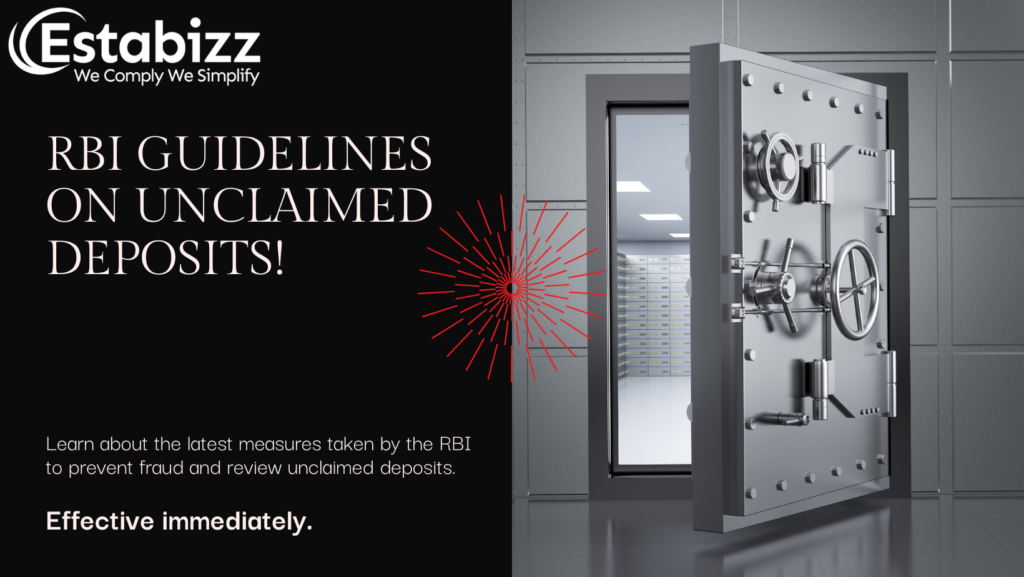RBI Issues Guidelines on Bank Classification of Unclaimed Deposits
Periodic Reviews and Fraud Prevention Measures
The Reserve Bank of India (RBI) recently released comprehensive guidelines for banks concerning the classification of accounts and deposits as inoperative and unclaimed. These measures include conducting periodic reviews of such accounts and deposits, implementing measures to prevent fraud in these accounts, and providing a grievance redressal mechanism for the expeditious resolution of complaints.
RBI guidelines also outline steps for tracing the customers of inoperative accounts, such as nominees and legal heirs, and detailing the process for account reactivation, claims settlement, and closure.
“100 Days 100 Pays” Campaign and Extension
The introduction of these guidelines comes after the RBI’s launch of the “100 Days 100 Pays” campaign in June last year. The campaign requires banks to trace and settle the top 100 unclaimed deposits for every bank in each district. Initially set to end on September 8, the deadline has now been extended to April 1, 2024.

RBI Unclaimed Deposit – Estabizz
Annual Review of Inactive Accounts
Under the new guidelines, RBI directs banks to undertake an annual review of accounts where no customer-induced transactions have occurred for more than a year. In cases without an explicit mandate to renew term deposits, banks should review such accounts if the customers have not withdrawn the proceeds after maturity or transferred them to their savings or current accounts. The aim is to prevent such deposits from becoming unclaimed.
Zero Balance Accounts and Government Concerns
RBI further instructs banks not to classify zero balance accounts as “inoperative” if they remain non-operational for more than two years. Central and state governments have reported difficulties in crediting cheques, Direct Benefit Transfers, Electronic Benefit Transfers, and scholarship amounts into these accounts due to their inoperative status stemming from the more-than-two-year inactivity.
Concurrent Audits and Monitoring Reactivated Accounts
New norms dictate that banks must ensure amounts lying in inoperative accounts or unclaimed deposits, including reactivated ones, are put under a concurrent audit. Transactions in reactivated accounts are to be monitored regularly for at least six months at higher levels, without the customers’ or dealing staff’s knowledge.

RBI Unclaimed Deposit – Estabizz
Unclaimed Deposits and the DEA Fund
Finally, RBI clarifies that balances in savings or current accounts not operated for ten years and term deposits not claimed for ten years from the date of maturity are to be classified by banks as unclaimed deposits. These funds are then transferred to the Depositor Education and Awareness (DEA) fund maintained by RBI.
Overall, these guidelines aim to provide banks with a clear framework for managing inoperative accounts and unclaimed deposits while protecting account holders’ interests and ensuring the integrity of the financial system. By taking these steps, the RBI aims to create more transparency and efficiency in managing unclaimed and inoperative accounts in India’s banking sector.
Further Measures and Implications for Banks and Account Holders
Enhanced Communication and Awareness Efforts
To ensure unclaimed and inoperative accounts are properly managed, banks should enhance their communication and awareness efforts. Customers should be well-informed about the status of their accounts and the potential consequences of inactivity. This can be achieved through regular reminders via emails, messages, or postal letters.
Digital Platforms for Tracking Account Status and Claiming Deposits
Banks could develop digital platforms to enable customers to check the status of their accounts and claim any outstanding deposits. Secure online services will make it easier for account holders to reactivate their accounts or settle unclaimed deposits from the comfort of their own homes.
Improved Know Your Customer (KYC) Compliance
Implementing more stringent KYC compliance measures will not only help banks trace account holders, nominees, and legal heirs more efficiently, but it will also aid in preventing fraud-related incidents. An up-to-date database will significantly reduce the number of inoperative and unclaimed accounts, as well as minimize potential risks to the bank and its customers.
Collaboration with Government and Regulatory Bodies
Effective collaboration between banks, government bodies, and regulators is crucial for enhancing the management of inoperative and unclaimed accounts. By sharing best practices and working together in implementing policies, such as the recently introduced RBI guidelines, these institutions can achieve better outcomes for account holders and the overall financial system.
The Impact on the Financial System
The measures introduced by RBI, along with the proactive steps taken by banks, will contribute to a more transparent, efficient, and robust financial system. By addressing issues related to unclaimed and inoperative accounts, the Indian banking sector will be better equipped to manage accounts more effectively, reduce risks to financial stability, and put forth a customer-centric approach moving forward.
In conclusion, the RBI guidelines on bank classifications of unclaimed deposits signal a step towards a more transparent and secure financial landscape within the Indian banking system. By addressing unclaimed deposits and inoperative accounts challenges, the guidelines, coupled with banks’ efforts, will pave the way for improved account management, enhanced regulatory compliance, and better customer experience in India’s financial sector.
Disclaimer:
Estabizz Fintech compiled the material in this article using the most recent Acts, Rules, Circulars, Notifications, Provisions, Press Releases, and material applicable at the time. They ensured the completeness and correctness of the material through due diligence. When using this material, users must consult the relevant, applicable legislation. The given data may change without prior notice and does not constitute professional advice. Estabizz Fintech disclaims all liability for any results from the use of this material.





